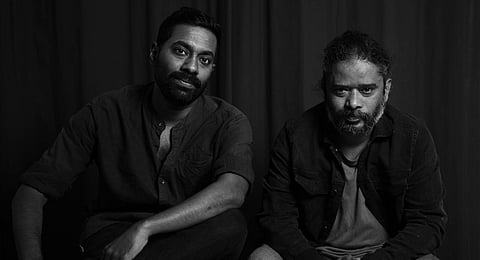‘Most of our scripts are improvised’
Rohit Penumatsa and Camp Sasi, are independent filmmakers who have garnered attention for their web series, Story Discussion, and Nirudyoga Natulu, both produced under their banner, Avanti Cinema. Their distinctive storytelling, innovative filmmaking techniques, and a strong commitment to non-mainstream narratives have earned them praise within the industry.
Their film ‘Double Engine’ will be released in limited theatres in India and the US on January 5
Excerpts from the interview:
What according to you is ‘alternate cinema’?
Rohit: Alternate cinema, in any language or region, would be pretty much an ‘alternate’ to the popular cinema. Even a straightforward action film, in the alternate space, will be dealt with differently, It’s an alternate aesthetic approach. However, independent and alternate cinema is not necessarily the same thing. In Telugu, what is considered Indie cinema as far as budgets go, is pretty much imitating the mainstream, and a bad imitation at that. Few directors and voices in Telugu have a truly independent approach to their work. The mainstream is not focusing on 99 things and you can make indie films about all of those things.
What inspired you to pick up this approach?
Sasi: I’ve been here for 23 years. I started with ads and corporate films. I was inspired to do some realistic cinema after being exposed to Mira Nayar’s films and some Iranian cinema. I didn’t know what it was called at that time because there was no internet. There is a popular Mira Nayar quote, “If we don’t tell our stories, no one else will.” That was what we sought to do. Tell our own stories.
How does the thought process work when you decide to make a movie?
Rohit: Something very simple, like what season it is. A new actor becomes exciting suddenly. We can write something around him or her. Sometimes, it’s a place. For example, our movie ‘Double Engine’ was a combination of the lead actor and his village. It was a very tiny village in the middle of nowhere. Both of them put together and everything else stemmed from that.
Could you talk about your upcoming films?
Rohit: Our next film is called ‘Gopi Galla Goa Trip’. There are two Gopis in this film.
Sasi: You can say, it’s a very rural and realistic ‘Dil Chahta Hai’. Two boys, going to Goa, to get some ‘girlfriend experience’. It’s your common-man story, put into some dramatic situation that causes all the excitement. In our work, we are not getting into any social issues. But when we do these stories, automatically, the economic background of the characters or their expression, education, everything is reflected. Every film we do revolves around money and most of it is improvised on the spot.
Could you talk a little about your challenges?
Rohit: It took us 10 years to get here and after the first five or six years, we slowly developed this very organic way of making films. Each film comes from the dust.
Sasi: Now, the biggest challenge is finding a producer. Money is the biggest problem. That’s why we’re trying the organic method. In this process, not just actors, we have also built a very strong technical base, in terms of cameramen, music directors, mixing, etc. We always try to put most of our funds into post-production to get that fine quality. We try to do sync sounds, something that filmmakers are scared of here. There are a lot of challenges to sync sound films because there is no scope for improving them in post-production. People think they can make it better in dubbing but most actors, even the good ones, struggle with dubbing.
Do you think people are accepting independent cinema?
Sasi: No, it’s getting tough because of YouTube and the ticket rates, especially. People are interested in independent or different cinema but getting an audience to theatre to watch it at the current ticket rates is difficult. People usually brand it as an OTT film and now even these platforms want us to first release films in theatre and then go to them.

